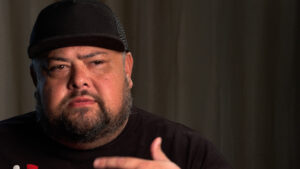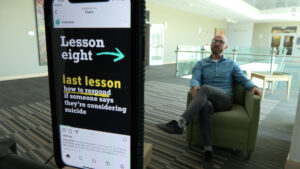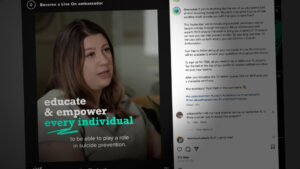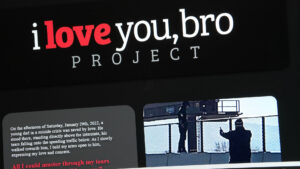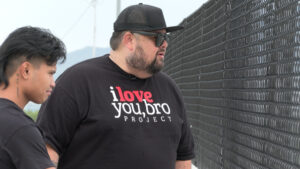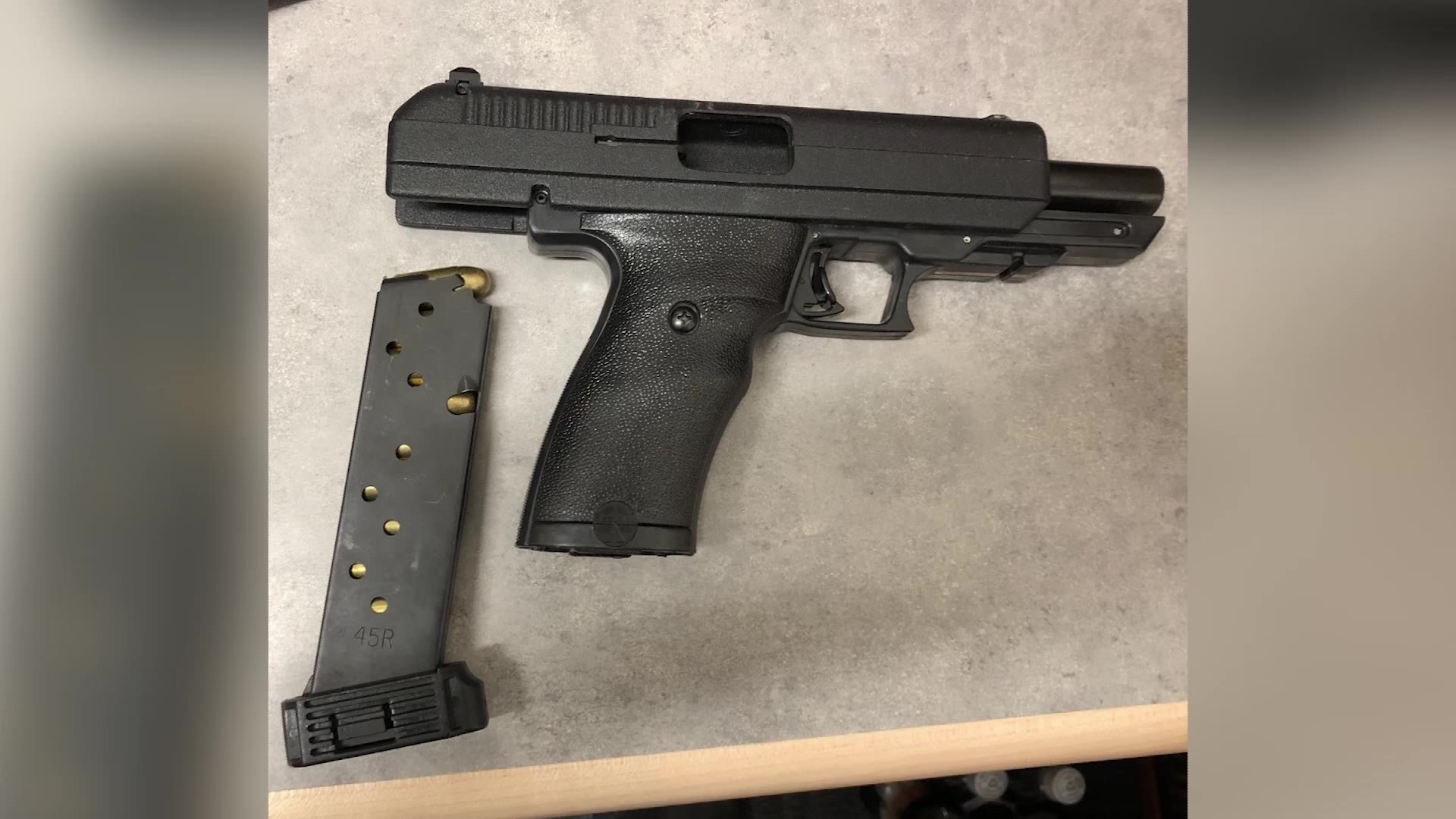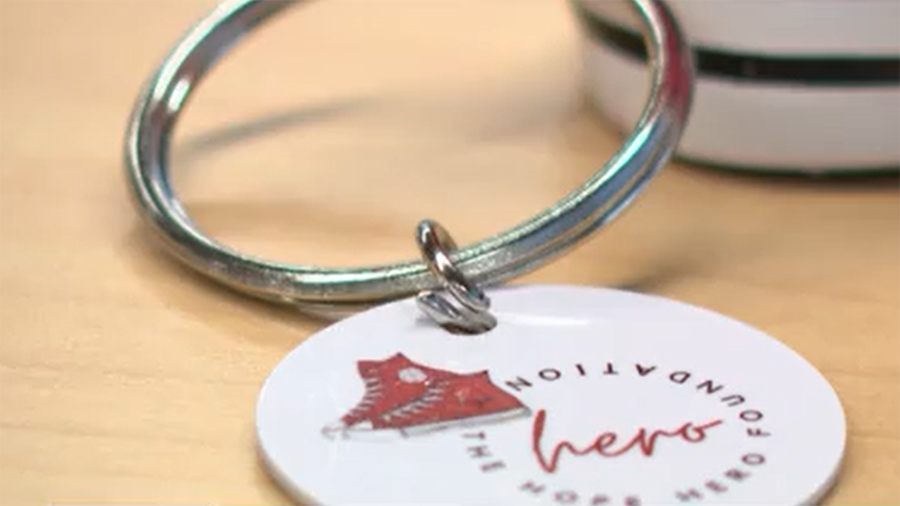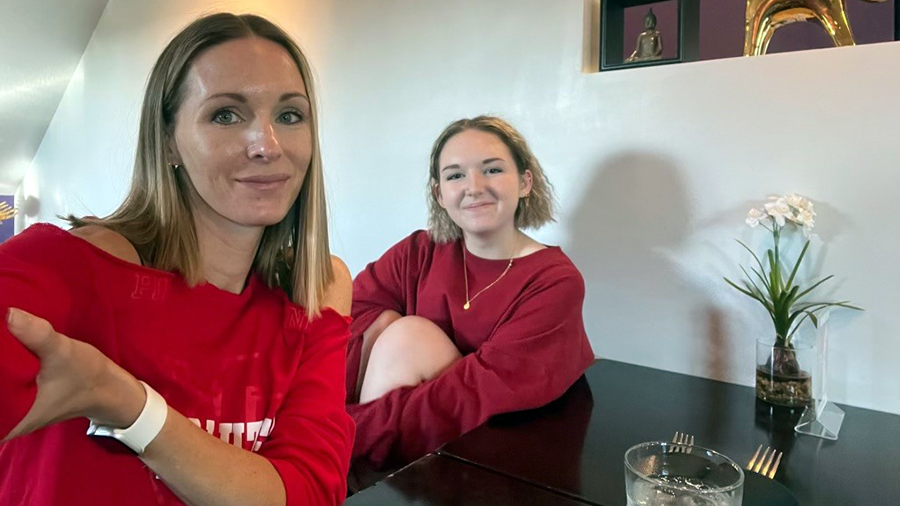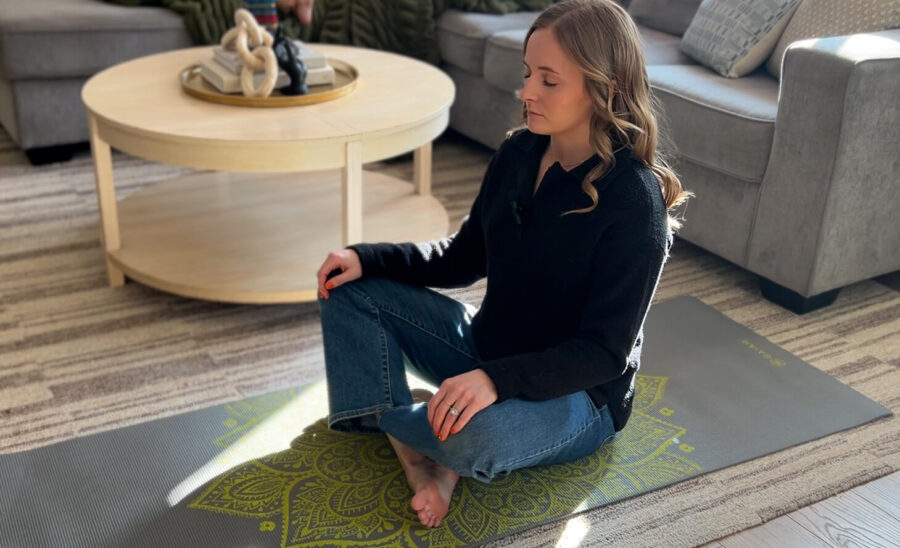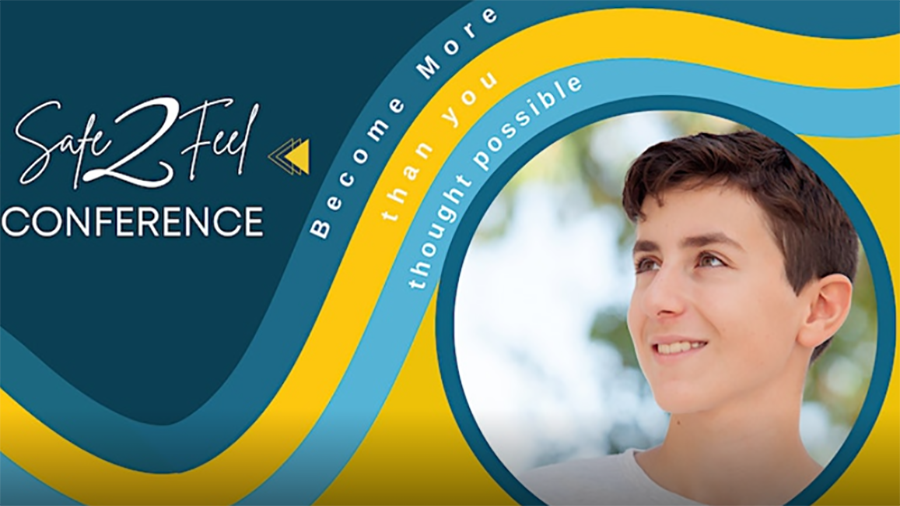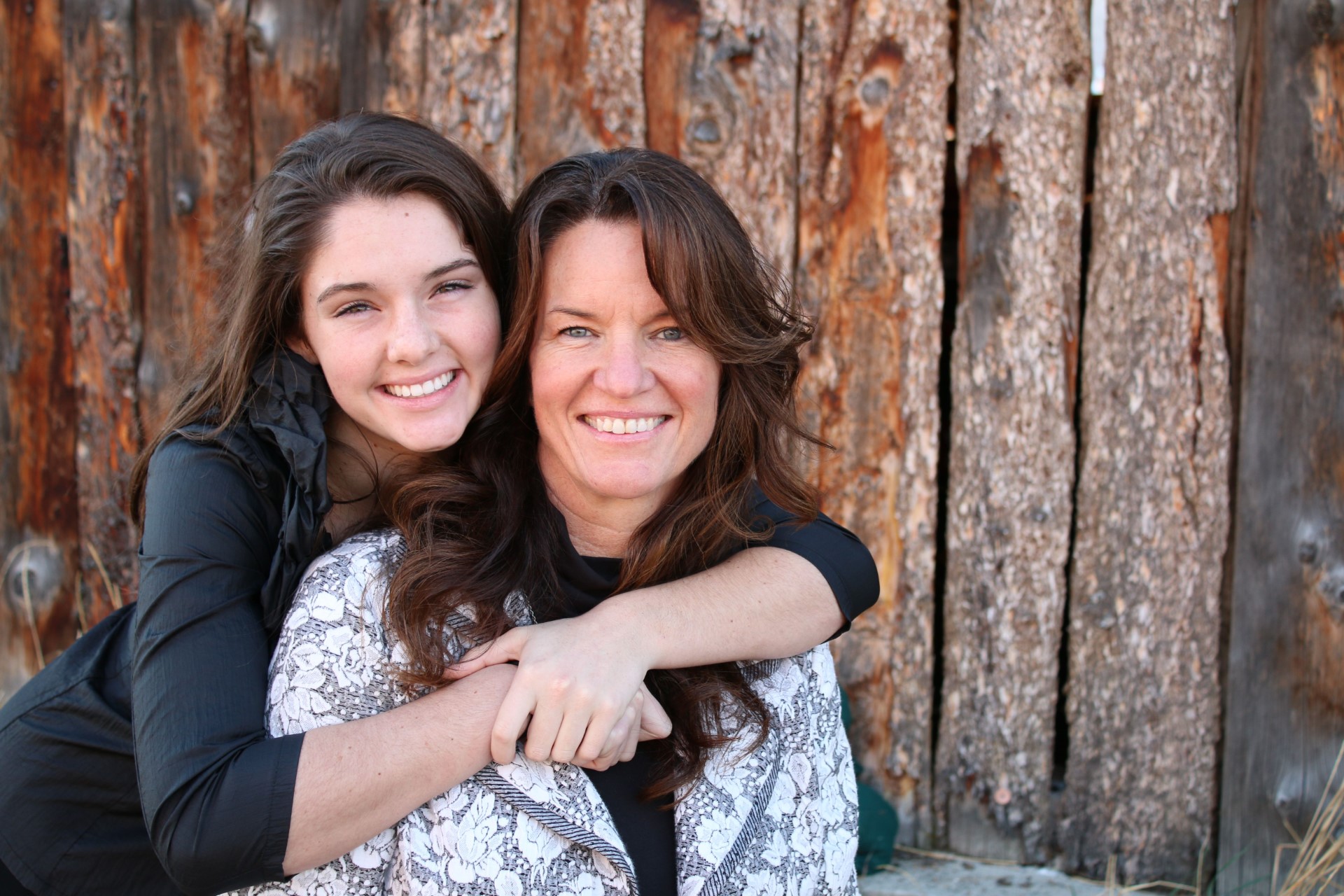Utah man’s mission began on an overpass
Sep 11, 2023, 4:07 PM | Updated: 4:16 pm
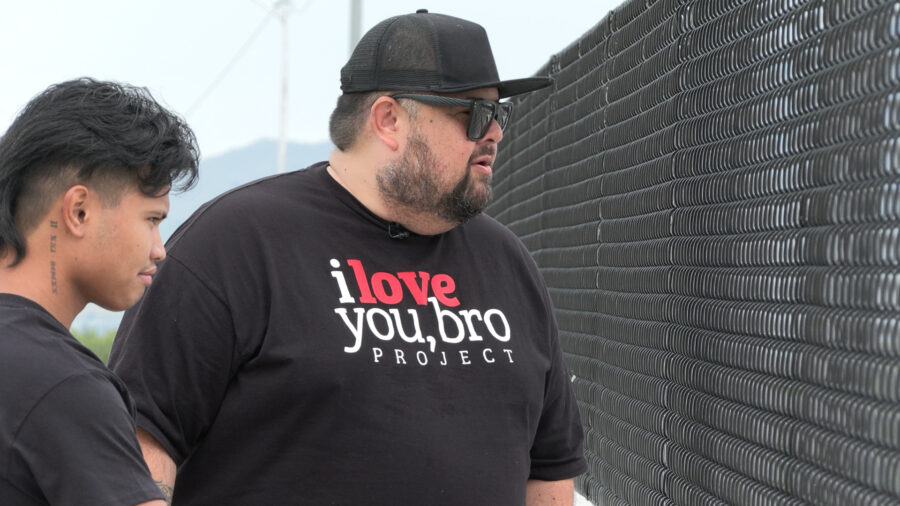
Aron and Joe Tuia'ana (KSL TV)
(KSL TV)
LEHI, Utah — Men are four times more likely than women to die by suicide. For Joe Tuia’ana that’s more than a statistic.
Last year the Lehi man and his daughters were on their way to a basketball game when something caught his eye – a man on a highway overpass. In his rearview mirror, he saw the man hop over the safety fence and perch on a narrow ledge above a busy I-15.
Tuia’ana turned his car around, told his daughters to call the police, parked, and started slowly walking towards the man.
“I was walking slowly towards him with my arms open,” he said.
“‘What would Jesus do literally in a situation?’” he asked himself. “And so I just told him ‘I love you, bro’ over, over, and over again.”
The man, whose name Tuia’ana would later learn was Aron, recalled “When I heard his voice and I saw him with his hands open to me, what I felt was love and peace.”
Aron requested that KSL not use his last name.
When Tuia’ana was close enough he leapt up and grabbed Aron’s jacket and Aron allowed himself to be pulled down to the safety of the sidewalk.
“And just held him in my arms, kept telling him ‘I love you, bro,’” Tuia’ana said. “That’s all that I literally could say to him. It’s all that could come out of my mouth and he was crying and holding on to me like one of my kids.”
As a result of that experience and a comment Joe Tuia’ana made that there’s no playbook for that situation, the State Department of Health and Human Services produced a playbook that’s now available on Instagram.
“The Gardiner Policy Institute did a study and they found that 91% of Utahns are impacted by suicide,” program administrator Scott Eyre, with the department’s Office of Substance Abuse and Mental Health, said. “And what we feel is that 100% of people need to know what to do in order to prevent suicide.”
Eyre says men are more likely to die by suicide because they are less likely to ask for help.
“In fact, sometimes there’s a stigma associated with help-seeking which is seen as a weakness,” he said. “I think the best thing we can do is reduce the stigma, the stigma of help-seeking behavior as being a weakness.“
He encourages everyone to take the Live On campaign’s Instagram course.
“Over the course of an hour, you can become a Live On ambassador and really understand the skills and the knowledge that you need to be able to prevent suicide.”
As a result of his experience, Joe Tuia’ana, with Aron’s support, is working on his own initiative, the I Love You, Bro Project, a non-profit dedicated to men’s mental health with support groups and educational opportunities.
“We can build our own tribe, our own village together with other likeminded men in our community,” Tuia’ana said. “There are so many people who have those same feelings. So many men who have are struggling in silence, who don’t have that peace.”
Today Tui’ana and Aron are more than friends, they say.
“He’s like my family,” Aron said. “I felt like I could be myself around him and whatever I tell him, he could just listen to me and understand what I’m telling him or what I’m going through.”
“I feel like talking to someone like Joe — and he’s the only person that I’m able to talk to — It helps me heal. And I feel like that’s something that I want to do for other people.”
“Suicide is preventable,” Eyre said. “If you or someone that you love or know, is thinking about suicide, you’re not alone. There are resources. There’s help. And the vast majority of people who have thoughts of suicide go on to recover and live healthy, fulfilling lives.”
If you or someone you know is struggling with thoughts of suicide, call the Suicide and Crisis Lifeline at 988.
Suicide prevention resources
If you or someone you know is experiencing suicidal thoughts or exhibiting warning signs, call, text, or chat the 988 Suicide and Crisis Lifeline at 988 which is answered 24/7/365 by crisis counselors at the Huntsman Mental Health Institute. All calls to legacy crisis hotlines, including the old National Suicide Prevention hotline, 1-800-273-8255, will also connect to a crisis care worker at the Huntsman Mental Health Institute as well.
Additional resources
- SafeUT: Parents, students, and educators can connect with a licensed crisis counselor through chat by downloading the SafeUT app or by calling 833-3SAFEUT (833-372-3388)
- SafeUT Frontline: First responders, including firefighters, law enforcement, EMS, and healthcare professionals can chat with a licensed crisis counselor at no cost 24/7/365 by downloading the SafeUT Frontline app.
- SafeUTNG: Members of the National Guard can chat with a licensed crisis counselor at no cost 24/7/365 by downloading the SafeUTNG app.
- Utah Warm Line: For non-crisis situations, when you need a listening ear as you heal and recover from a personal struggle, call 1-833 SPEAKUT 8:00 a.m.-11:00 p.m., 7 days a week, 365 days a year.
- The Huntsman Mental Health Institute offers a wide variety of programs and services including suicide prevention and crisis services, hospital treatment, therapy & medication management, substance Use & addiction recovery, child & teen programs, and maternal mental health services including birth trauma, pregnancy loss, infertility, and perinatal mood and anxiety disorders.
- LiveOnUtah.org is a statewide effort to prevent suicide by promoting education, providing resources, and changing Utah’s culture around suicide and mental health. They offer resources for faith based groups, LGBTQ+, youth, employers, firearm suicide prevention, and crisis and treatment options.

